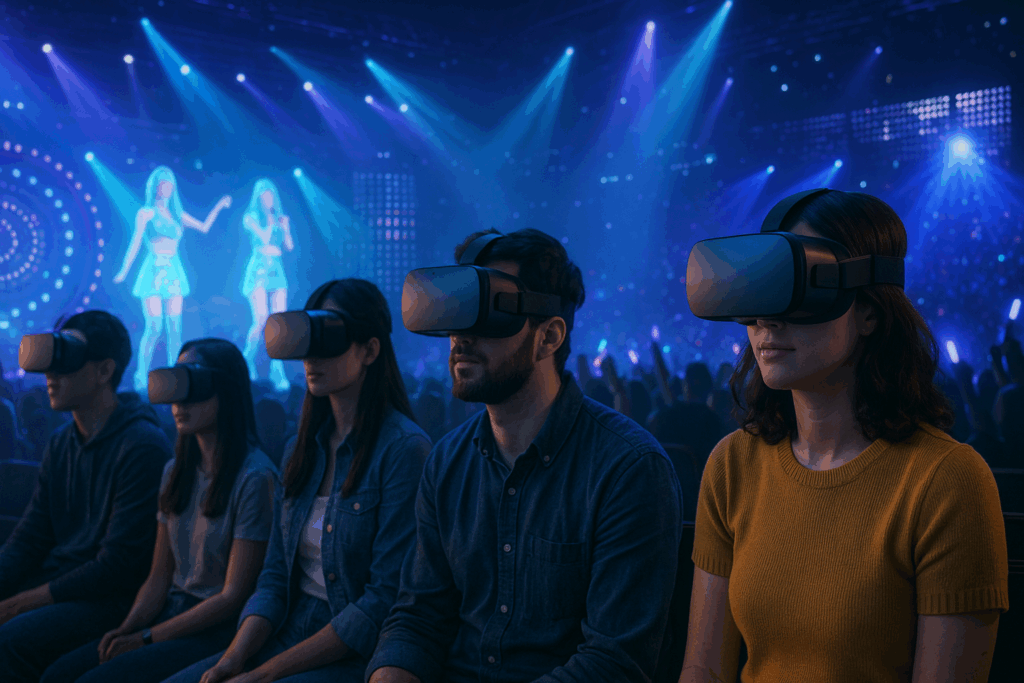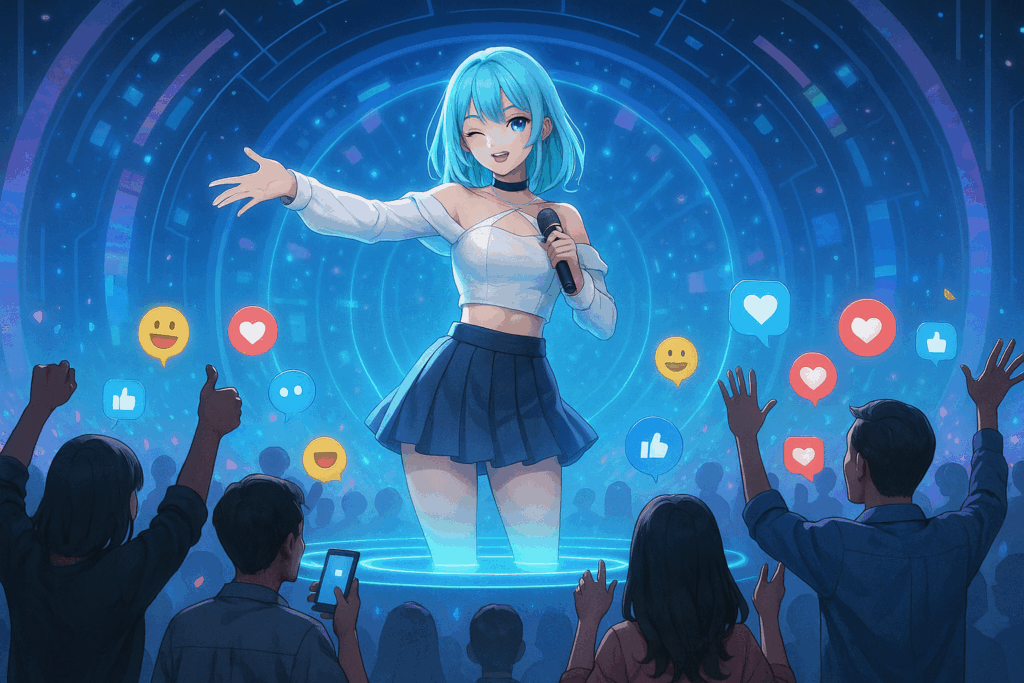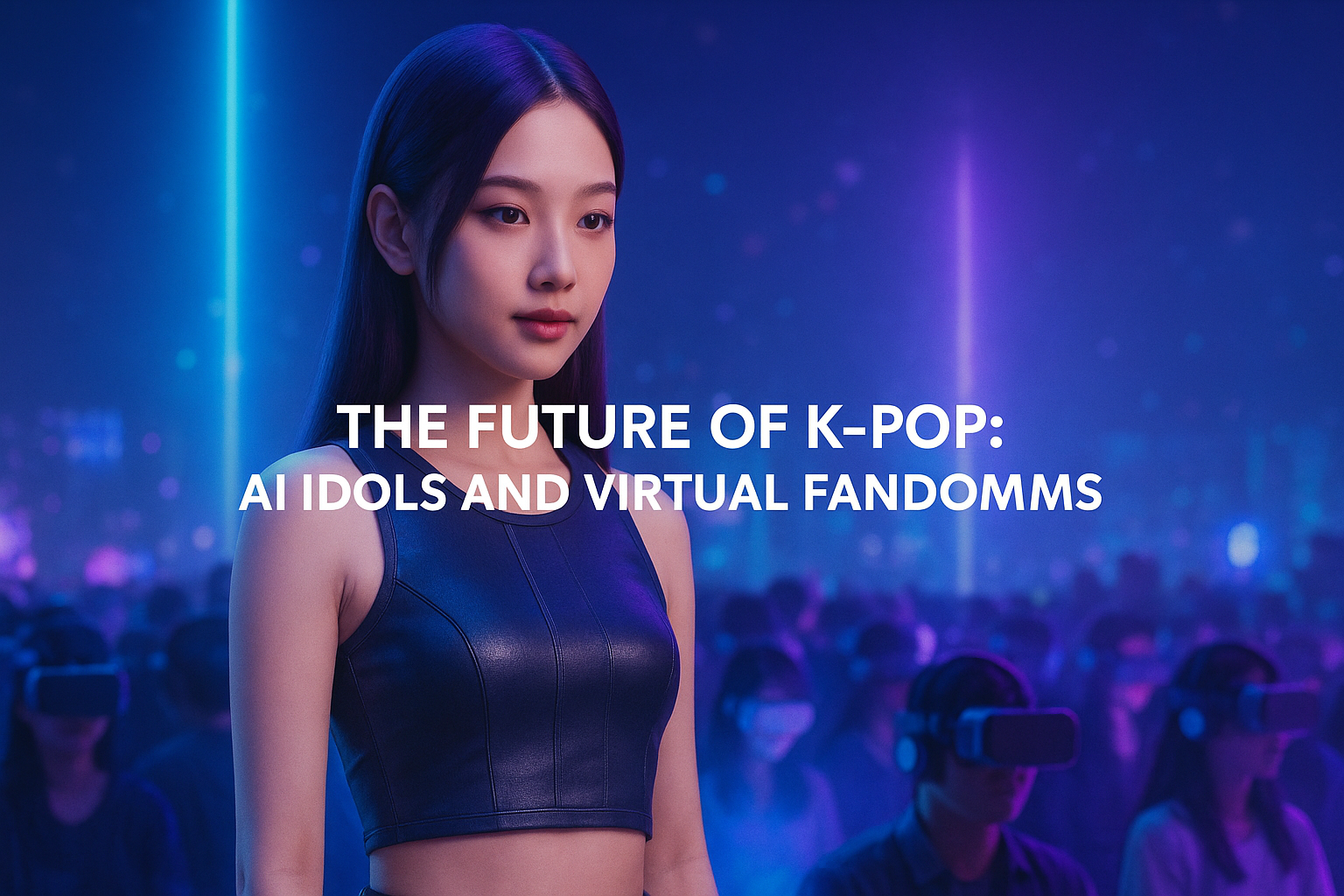The Future of K-Pop: AI Idols and Virtual Fandoms
When human creativity meets artificial intelligence, the Future of K-Pop begins.
K-Pop has always been a symbol of innovation — a blend of art, technology, and marketing.
Now, as AI idols and virtual fandoms rise, we are witnessing a new era of emotional and cultural transformation.
The Next Evolution of K-Pop
From holographic stages to metaverse concerts, K-Pop continues to evolve.
This evolution isn’t just about digital performance — it’s about how technology amplifies emotion.
AI idols like MAVE: and Eternity show how creativity and code can coexist to inspire millions.
👉 Read more: K-Pop Metaverse Trends
AI Idols: Perfection Without Limits
AI idols represent limitless adaptability.
They can sing in multiple languages, perform anytime, and interact with fans 24/7.
Behind them are teams of artists, animators, and data scientists crafting digital emotion.
If fans feel a real emotion from an AI performance, does it matter that the idol isn’t human?
That question defines the future of K-Pop.
AI idols are not replacing humans — they extend human creativity and reimagine what artistry means in the digital world.

Virtual Fandoms and the Redefinition of Community
The K-Pop fan ecosystem has always been ahead of its time — digital-first, globally connected, emotionally invested.
Now, with the rise of metaverse platforms, fandom is evolving into something even more immersive.
Fans gather in virtual arenas, represented by avatars, attending real-time concerts streamed in augmented reality.
They buy digital merchandise, create 3D fan art, and even gift virtual items directly to their idols’ avatars.
This isn’t passive consumption; it’s active participation.
Fandom has become a collective performance in itself.
Virtual fandoms also challenge the traditional economics of the music industry.
Instead of selling physical albums or tickets, agencies can now monetize digital interaction — from avatar skins and virtual fan meetings to blockchain-based collectibles.
The entire concept of “ownership” in fandom is shifting from tangible to experiential.
But what’s most fascinating is emotional authenticity.
Despite the digital interface, fans still cry, cheer, and connect.
Their emotions are real — the medium has simply evolved.
K-Pop has always been about emotional synchronization, and virtual fandoms amplify that harmony beyond physical limitations.

The Technology of Emotion
AI and metaverse technologies often evoke fear of dehumanization — of replacing genuine feeling with synthetic illusion.
But in K-Pop, technology has always served emotion, not replaced it.
From lightstick networks that synchronize with concert music, to holographic projections that let idols “perform” posthumously, K-Pop consistently uses innovation to deepen connection, not distance it.
The next step is more intimate: emotional AI capable of recognizing fan sentiment in real time and responding dynamically.
Imagine an AI idol who can sense when a fan feels sad and adjust their voice tone or message accordingly.
Such interactions could create powerful para-social relationships — personalized, comforting, and endlessly available.
However, this evolution also raises ethical and psychological questions.
Where does genuine empathy end and algorithmic simulation begin?
Will fans form emotional attachments to code?
And how will that affect human relationships?
The answers aren’t clear yet — but K-Pop is once again the global laboratory where culture, business, and emotion intersect.
Industry Perspective: A Strategic Frontier
From a business standpoint, AI idols solve several long-standing challenges in the entertainment sector:
no scheduling conflicts, no scandals, no physical exhaustion, and minimal production cost per appearance.
They offer scalability at a level no human system can match.
Major Korean entertainment agencies are already restructuring to accommodate this future.
SM Entertainment’s SMCU (SM Culture Universe), HYBE’s partnerships with Metaverse Entertainment, and YG’s experiments with AI-driven brand collaborations all point to one direction — the hybridization of digital and human performance.
But even as the industry invests in virtual talent, one truth remains: emotional credibility still determines success.
Audiences can forgive imperfection, but not insincerity.
The challenge for producers is to ensure that AI idols maintain the one quality that defines K-Pop — emotional resonance.

A Cultural and Human Reflection
K-Pop has always mirrored the aspirations of its audience — discipline, beauty, innovation, and hope.
AI idols and virtual fandoms are simply the next reflection, shaped by a world more connected yet more isolated than ever.
In this context, technology becomes a tool for empathy.
It allows connection where physical distance once made it impossible.
And perhaps, that is why AI idols resonate.
They are not replacing humanity — they are reminding us of what we long for most: recognition, belonging, and understanding.
As someone who has witnessed the evolution of K-Pop from tightly choreographed stages to fully immersive metaverse concerts,
I believe its strength has never been about perfection — it has always been about adaptability.
K-Pop evolves because it listens — to fans, to technology, and to emotion itself.
The future will not be a battle between AI and humans.
It will be a collaboration, where creativity and code coexist.
And when that happens, K-Pop will once again lead the world — not by being louder, but by being more human than ever before.
🎵 Experience the Future of K-Pop with immersive VR concerts and AI-powered music.
👉 Check VR headsets and audio gear on Amazon
